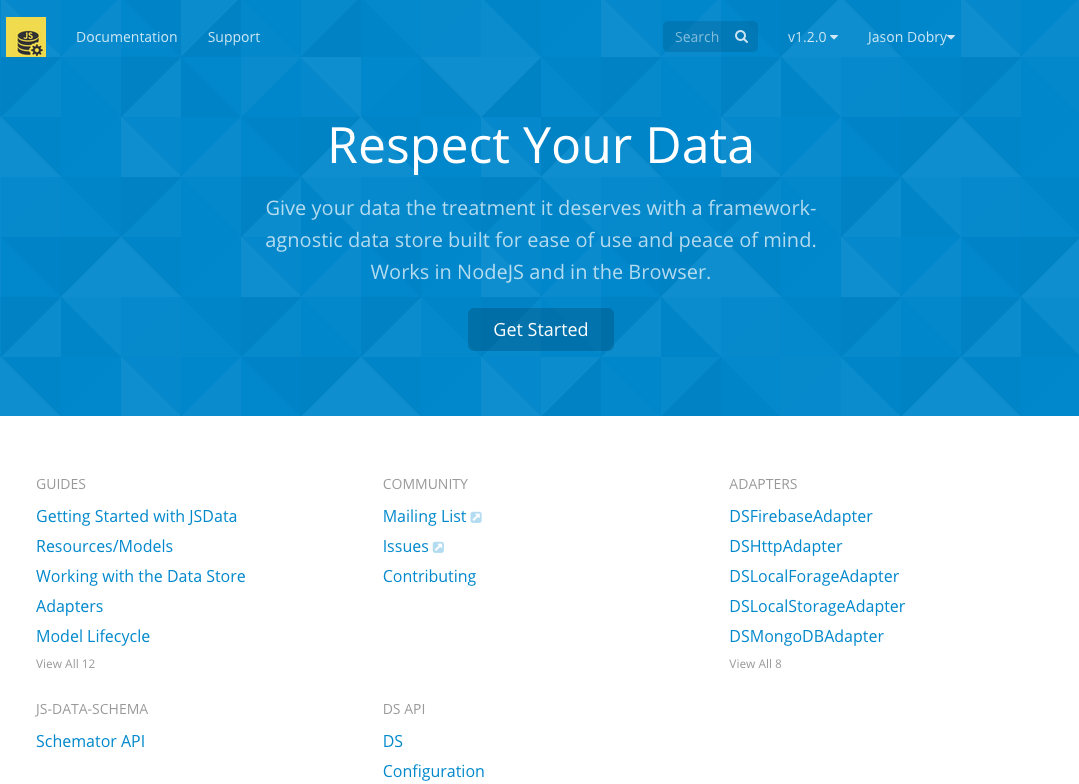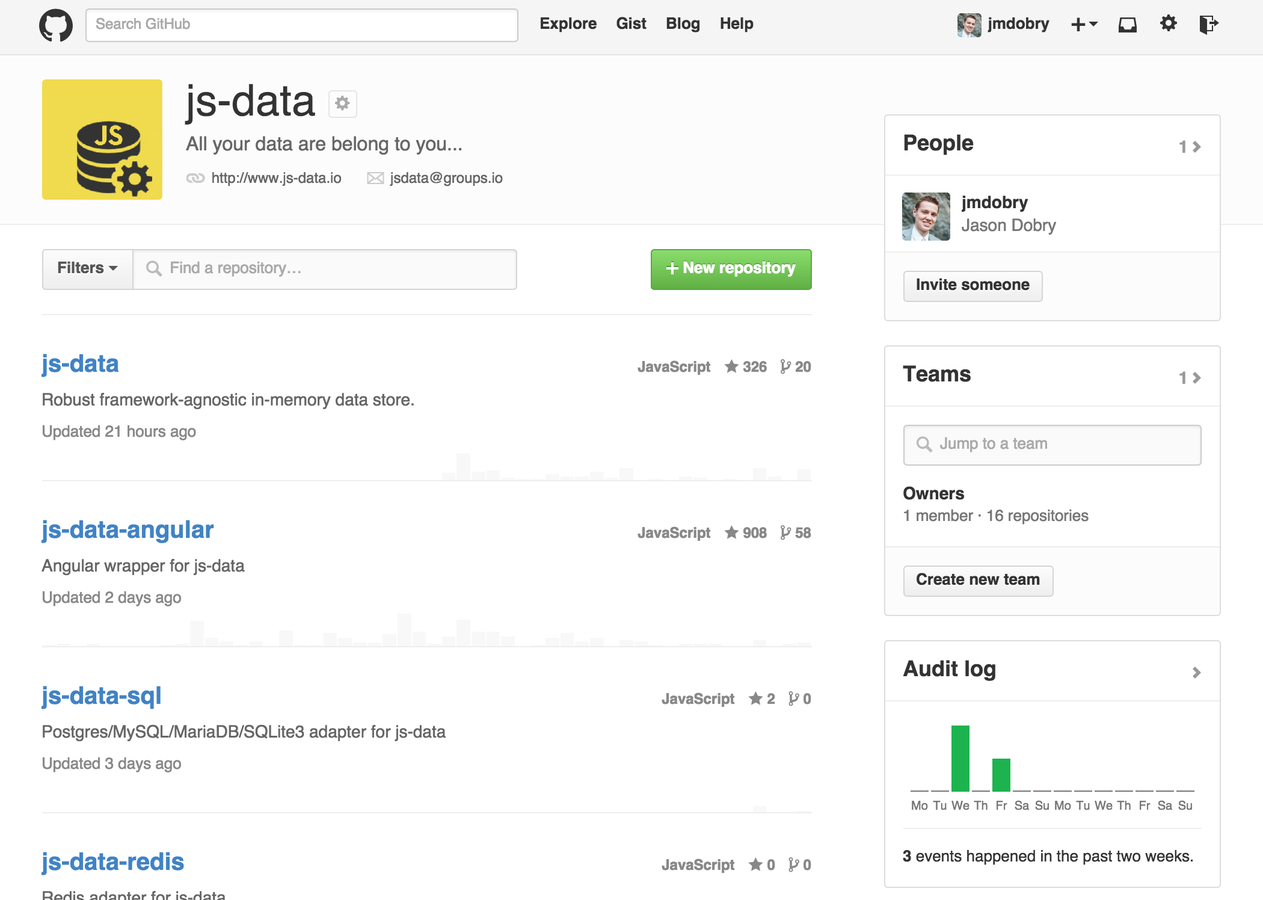js-data.io

@jmdobry


Me
Husband. Father.
Soccer. Lots of Soccer.
Canyoneering/Hiking.

Fun Facts
I speak Russian.
Completed Dota 2 all hero challenge.
My Daughter
Work
Software Engineer at Lendio.
Frontend + Node/PHP/MySql.
Data Science/Machine Learning (last 7 months).
Open Source
Talks
Side Project
codetrain.io - Write snippets of code. Execute. Share. Discuss.
Why js-data?
Background
Server-side rendering
Browser
Server
Request
Html
Majority of the work was done on the server
Browsers were slow
Example: Java Struts + .jsp
The only storage option
was your database
Controller
Model
View
View
User
DB
~Web 2.0
Browsers got faster
Browser
Server
REST
JSON
Offload work to the clients
Demand for dynamic content
More storage options: localStorage, indexedDB, BAAS
Send data & templates to clients, render in the browser
Controller
Model
View
User
Request
Model
Controller
localstorage
indexdDB
BAAS
DB
Server
REST
JSON
Model = ?
Request
jQuery
MooTools
Mithril
Ember
Angular
React
ExtJS
Backbone
Dojo
Knockout
Spine
Polymer
YUI
CanJS
Ampersand
Vue.js
Aurelia
Meteor
Flight
DB
js-data server adapters:
MySql
PostgreSql
MariaDB
SqlLite3
Redis
MongoDB
RethinkDB
HTTP
Firebase
Browser
Model = ?
js-data
js-data
So many...
localStorage
indexedDB
BAAS
js-data client adapters:
HTTP
Firebase
localStorage
localForage


You?
js-data philosophies
Easy, up and running fast
Recognizable API
Dead simple CRUD
Framework-agnostic
Storage-agnostic
Convention + Configuration
Design by Contract
Store + Adapters
var store = new JSData.DS();In-memory store
store.registerAdapter(
'http',
new DSHttpAdapter(),
{ default: true }
);var basePath = 'https://js-data-firebase.firebaseio.com';
store.registerAdapter(
'fb',
new DSFirebaseAdapter({
basePath: basePath
})
);http
firebase
Resources
var District = store.defineResource({
name: 'district'
});In-memory store
store.registerAdapter({
name: 'school',
relations: {
belongsTo: {
district: {
localKey: 'district_id',
localField: 'district'
}
}
}
});District
School
Defaults
In-memory store
District
School
idAttribute:"id"
GET /district
POST /district
GET /district/:id
PUT /district/:id
DELETE /district/:id
idAttribute:"id"
GET /school
POST /school
GET /school/:id
PUT /school/:id
DELETE /school/:id
"belongsTo" -> District
default settings
inherit
Sync vs Async
District.get(1); // undefinedstore
http
DS#get
undefined
var promise = District.find(1);
DS#find
Promise
GET /district/1
JSON
DS#get
{ id: 1, ... }
promise.then(function (district) {
district; // { id: 1, name: 'Alpine' }
District.get(1) === district; // true
return District.find(1);
}).then(function (district) {
District.get(1) === district; // true
});resolve
DS#find
resolve
Sync vs Async
var district = District.get(1);
district.name = 'Wasatch';store
http
DS#get
{ id: 1, ... }
var promise = District.save(1);
DS#save
Promise
PUT /district/1
JSON
DS#get
{ id: 1, ... }
promise.then(function (district) {
district; // { id: 1, name: 'Wasatch' }
District.get(1) === district; // true
return District.destroy(1);
}).then(function () {
District.get(1); // undefined
});resolve
DS#destroy
resolve
DELETE /district/1
response
How it works
Sync (in-memory store)
Async (delegated to adapters)
get()
find(), loadRelations()
filter()
findAll(), loadRelations()
inject(), item.foo = 'bar'
save(), update(), updateAll()
eject(), ejectAll()
destroy(), destroyAll()
Demos
Features
Model Lifecycle Hooks
beforeCreate
afterDestroy
afterInject
beforeCreateInstance
etc.
Relations
belongsTo
hasMany
hasOne
loadRelations()
link(), linkAll(), unlink()
Features
Static Methods
Instance Methods
var User = store.DefineResource({
name: 'user',
actions: {
fooStaticMethod: {
method: 'POST'
}
}
});
User.barStaticMethod = function () {...};
User.fooStaticMethod();
User.barStaticMethod();var User = store.DefineResource({
name: 'user',
methods: {
say: function () {
return this.name;
}
}
});
var user = User.createInstance({
name: 'John'
});
user.say(); // "John"Features
Convenient Shorthands
Computed Properties
var User = store.DefineResource('user'});
var user = User.inject({ id: 1 });
user.name = 'John';
// these are equivalent
store.save('user', 1);
User.save(1);
user.DSSave();var User = store.DefineResource({
name: 'user',
computed: {
fullName: ['first', 'last', function () {
return this.first + ' ' + this.last;
]
}
});
var user = User.inject({
id: 1,
first: 'John',
last: 'Anderson'
});
user.fullName; // "John Anderson"Features
Query Collections
Schemas + Validation
var User = store.DefineResource('user'});
User.inject({ id: 1, age: 30 });
User.inject({ id: 2, age: 15 });
User.inject({ id: 3, age: 15 });
User.filter({
where: {
age: {
'>': 18
}
}
}); // [{ id: 1, age: 30 }]
User.filter({
age: 15
}); // [{id: 1,age: 15},{id: 3,age: 15}]// Requires js-data-schema
var User = store.DefineResource({
name: 'user',
schema: {
name: 'string'
}
});
var user = User.inject({
id: 1,
name: 999
});
user.DSSave().catch(function (err) {
err.name.errors[0].rule; // "type"
err.name.errors[0].expected; // "string"
err.name.errors[0].actual; // "number"
});Features
Change Detection
Cache Expiration
// uses Object.observe (or polyfill)
var User = store.DefineResource('user'});
var user = User.inject({ id: 1 });
User.hasChanges(1); // false
user.name = 'John';
setTimeout(function () {
User.hasChanges(1); // true
User.previous(1); // { id: 1 }
User.changes(1); // {added:{name:'John}}
}, 30);var User = store.DefineResource({
name: 'user',
// check every 30 sec
reapInterval: 30000,
// items expire after 15 min
maxAge: 900000,
// eject expired items
reapAction: 'eject'
});Thanks!

https://joind.in/14051